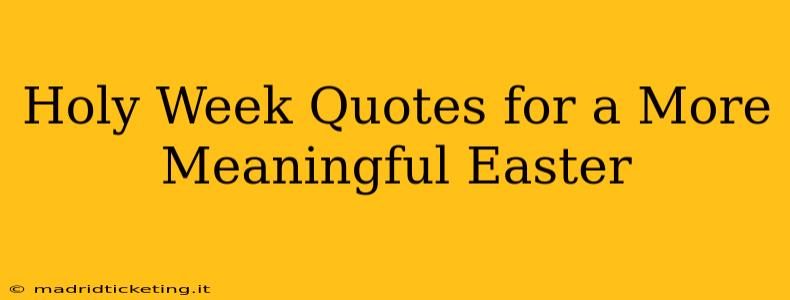Easter, the culmination of Holy Week, is a time for reflection, renewal, and celebrating the resurrection of Jesus Christ. But the journey to Easter Sunday is just as important, a powerful narrative of sacrifice, suffering, and ultimate triumph. Holy Week, encompassing Palm Sunday through Easter Sunday, offers a rich tapestry of events ripe for contemplation. Reflecting on poignant quotes from this period can deepen your understanding and appreciation of the Easter message. This post delves into the significance of Holy Week and provides insightful quotes to enhance your Easter experience.
What is Holy Week?
Holy Week, also known as Passion Week or Great Week, is the week leading up to Easter Sunday in the Christian liturgical calendar. It begins on Palm Sunday, commemorating Jesus' triumphal entry into Jerusalem, and culminates on Easter Sunday, celebrating his resurrection. The days between are filled with significant events detailing Jesus' last days, including the Last Supper, his betrayal, trial, crucifixion, and death. Understanding these events profoundly enhances the meaning of Easter.
Meaningful Holy Week Quotes and Their Significance
Here are some powerful quotes that encapsulate the spirit and meaning of Holy Week, inspiring reflection and a deeper connection with the Easter story:
"Greater love has no one than this: to lay down one's life for one's friends." - John 15:13
This verse from John's Gospel summarizes the heart of Jesus' sacrifice. It speaks to the ultimate act of love – surrendering oneself for the sake of others. Reflect on the depth of this selfless act and its implications for your own life. How can you demonstrate this kind of love in your daily interactions?
"And he said to them, “My soul is overwhelmed with sorrow to the point of death.” – Matthew 26:38
This quote illustrates the intense emotional burden Jesus carried during his final hours. He felt the weight of the world's sins, facing imminent suffering and death. Recognizing his human vulnerability adds another layer of empathy to our understanding of his sacrifice.
"Father, forgive them, for they do not know what they are doing." - Luke 23:34
This powerful prayer from the cross reveals Jesus' unwavering compassion even in the face of immense suffering. His forgiveness extends to those who caused his pain, emphasizing the transformative power of grace and mercy. This passage challenges us to forgive those who have wronged us, mirroring the boundless forgiveness of Jesus.
"It is finished." - John 19:30
These final words uttered by Jesus on the cross signify the completion of his mission. He accomplished the work of redemption, securing salvation for humanity. It's a powerful reminder of the ultimate victory achieved through sacrifice.
"He is not here; he has risen!" - Matthew 28:6
This triumphant declaration signifies the core message of Easter – the resurrection of Jesus Christ. This event is the cornerstone of Christian faith, demonstrating the power of God over death and offering hope for eternal life.
How can I make this Easter more meaningful?
Many people find incorporating reflection and prayer into their Holy Week observances enriches their Easter experience. Consider attending special Holy Week services at your church, engaging in personal Bible study, or spending time in quiet reflection, pondering the profound events of this pivotal week. By actively engaging with the story, rather than simply observing the holiday, you can unlock a deeper understanding and appreciation for the true meaning of Easter.
Why is reflecting on Holy Week important?
Reflecting on Holy Week allows us to connect with the depth of Jesus' sacrifice and understand the true significance of Easter. It moves beyond simply celebrating a holiday and delves into the spiritual journey that culminates in the resurrection. This deeper understanding fosters faith, encourages personal growth, and inspires a more profound appreciation for the gift of grace.
What are some Holy Week traditions?
Holy Week traditions vary among different Christian denominations, but many incorporate elements like special church services, processions, and reflective activities. Some common traditions include Palm Sunday processions, Maundy Thursday services commemorating the Last Supper, Good Friday services focusing on the crucifixion, and Easter Sunday celebrations celebrating the resurrection. These traditions serve as a means of commemorating the pivotal events of Holy Week and strengthening faith.
By thoughtfully considering the events of Holy Week and the accompanying quotes, you can experience a more meaningful and spiritually enriching Easter. Remember, Easter isn’t just a holiday; it’s a celebration of hope, redemption, and new life.

